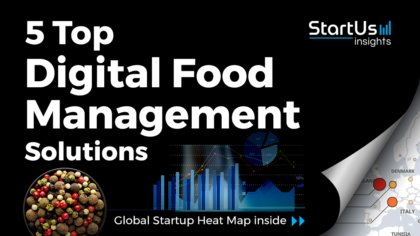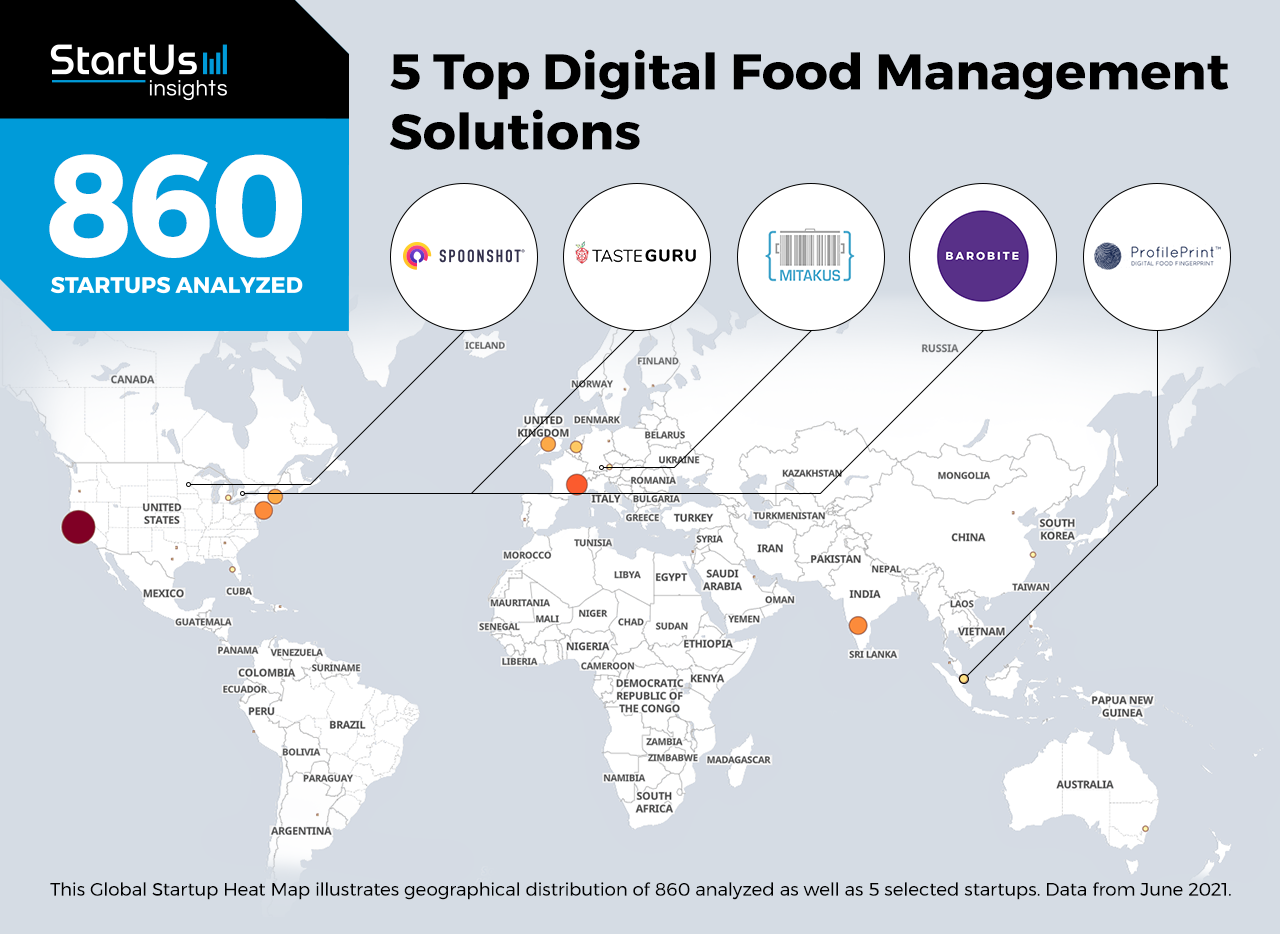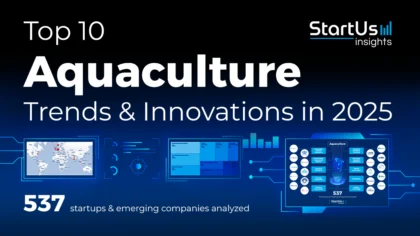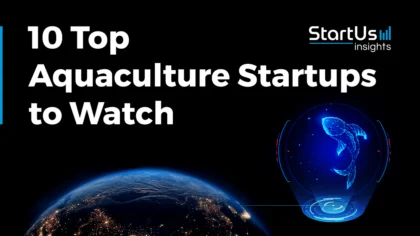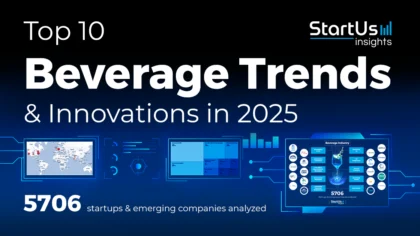Accelerate Productivity in 2025
Reignite Growth Despite the Global Slowdown
Staying ahead of the technology curve means strengthening your competitive advantage. That is why we give you data-driven innovation insights into the food industry. This time, you get to discover 5 hand-picked digital food management solutions.
Global Startup Heat Map highlights 5 Top Digital Food Management Solutions out of 860
The insights of this data-driven analysis are derived from the Big Data & Artificial Intelligence-powered StartUs Insights Discovery Platform, covering 2.093.000+ startups & scaleups globally. The platform gives you an exhaustive overview of emerging technologies & relevant startups within a specific field in just a few clicks.
The Global Startup Heat Map below reveals the distribution of the 860 exemplary startups & scaleups we analyzed for this research. Further, it highlights 5 food startups that we hand-picked based on criteria such as founding year, location, funding raised, and more. You get to explore the solutions of these 5 startups & scaleups in this report. For insights on the other 855 digital food management solutions, get in touch.
TasteGuru provides AI-driven Consumer Insights
The digitization of the food and beverage (F&B) industry enables food businesses to collect data points at each step of the value chain. This includes real-time tracking data from food condition monitoring sensors to customer data points from public channels such as social media. With artificial intelligence and data analytics, startups utilize this data to derive valuable insights into production operations as well as market and consumer preferences.
Canadian startup TasteGuru offers AI-driven consumer insights for food and beverage manufacturers. The startup’s Trend Forecasting Platform uses consumer data to identify high-growth trends in the food industry. This platform increases innovation success and reduces time to market by suggesting product concepts with high success potential based on consumer sentiment and conversation volume. In addition, TasteGuru’s solution allows food brands to personalize marketing campaigns and improve engagement.
Spoonshot generates Food Innovation Intelligence
The COVID-19 pandemic is accelerating restaurant digitization, thereby enabling digital touchpoints at various levels in customer-facing food businesses. This allows food providers to collect end-to-end operational data from procurement and inventory management to sales and customer behavior. Food businesses use this information to personalize dishes based on consumer preferences as well as optimize their kitchen operations and supply chains for cost savings.
Based in the US, Spoonshot is a food science startup that offers food innovation intelligence. The startup uses a proprietary AI tool called #foodbrain and food science domain knowledge to collect and connect disparate data points in the food industry. These include physical properties of ingredients, information from recipe databases and cookbooks, as well as consumer data, among others. This data is then used to generate consumer insights, develop new recipes, predict trends, discover flavors, and more. Spoonshot’s solution enables food companies to better understand the global food market through disconnected channels and streamline their production accordingly.
Mitakus creates a Demand Forecasting Platform
One of the critical advantages of digital food management is accurate demand predictions. Startups utilize machine learning (ML)-based prediction models to learn the historical market and customer data to forecast future trends. Food companies use this data to reduce inventory loss and optimize supply chain management. This way, food businesses equip themselves for market fluctuations without incurring huge losses in procurement and storage. At the production level, food companies utilize this data to improve productivity and minimize costs.
Mitakus is a German startup that develops a web-based software platform to provide forecasts for production and procurement. The startup uses machine learning and AI to analyze historical internal data such as sales, purchasing, and menus as well as external data points like weather and holidays. Since Mitakus uses algorithms that improve prediction accuracy over time, chefs and production & purchasing managers gain deeper visibility into business requirements. In effect, the startup improves sales, saves time, and reduces food wastage at restaurants.
ProfilePrint offers Digital Food Fingerprinting
Monitoring food conditions at inventories allow food manufacturers to promptly identify products that are nearing expiry and use them before they go bad. Also, digital food fingerprinting allows food companies to identify low-quality products and avoid consumer backlashes. Such data-driven approaches significantly reduce overall operating expenses and improve efficiency. That is why startups develop effective food management solutions to optimize the food industry processes and improve cost savings.
ProfilePrint is a Singaporean startup that develops proprietary AI-based digital food fingerprinting for rapid assessment of food ingredients. The startup’s portable analyzer captures chemical signatures and processes them with proprietary machine learning algorithms, a combination of chemometrics, and AI models. Its customized AI models also predict the quality profile of unknown samples. ProfilePrint’s platform integrates interrelated parameters and sensory data into a single digital fingerprint to build intelligent and resilient supply chains. Further, the solution allows food graders along verticals such as tea, coffee, and cocoa to efficiently detect counterfeits and spoilage without expensive lab equipment or technical training.
BaroBite automates Brand Marketing
Marketing is an integral part of food management to generate a brand following and drive sales. Digital food management facilitates digital marketing with historical and real-time customer preferences. This is critical for restaurant chains and food brands that use direct-to-consumer (D2C) distribution. That is why startups develop customer analytics and support platforms for food providers to better understand and connect with their customers.
Canadian startup BaroBite automates marketing for restaurants, bars, and lounges. The startup uses AI-powered WiFi access points that automatically learn customer behavior and offer personalized deals to build loyalty. BaroBite’s solutions include social media management for their clients to publish curated media for targeted marketing as well as posts and story scheduling. The BaroBot is the startup’s Facebook chatbot that assists and engages customers. The startup’s solutions enable automated marketing for restaurants and generate revenue as well as brand reputation.
Discover more Food Tech Startups
Food tech startups such as the examples highlighted in this report focus on robotics, 3D food printing, alternative proteins as well as personalized nutrition. While all of these technologies play a major role in advancing the food industry, they only represent the tip of the iceberg. To explore more food technologies, simply get in touch to let us look into your areas of interest. For a more general overview, you can download our free Food Innovation Report to save your time and improve strategic decision-making.
